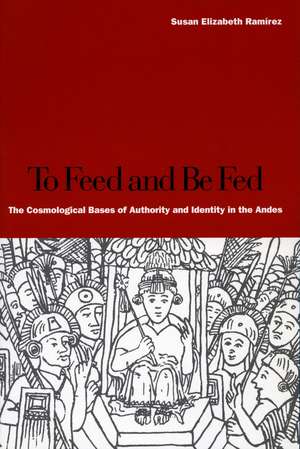To Feed and Be Fed: The Cosmological Bases of Authority and Identity in the Andes
Autor Susan Ramírezen Limba Engleză Paperback – 15 iun 2005
This book reexamines the structure of Inca society on the eve of the Spanish conquest. The author argues that native Andean cosmology, which centered on the idea of divine rulership, principally organized the indigenous political economy as well as spatial and socio-kinship systems.
Ramírez begins by establishing that the phrase "el Cuzco," picked up from the native peoples by the Spanish invaders, referred not only to a place but also to the Inca leader. This leader acted as the center of the Inca universe, connecting the people to their ancestors, nature, and each other. From this starting point, the author revisits the Inca cosmology and looks at the way in which the ruler and other authorities connected the people to the gods and bound a diverse polity together under divine protection. Next, the book shows how rituals immortalized these leaders and connected the people to past generations. Finally, the author examines how a cosmology, centered on the divine nature of the king, defined the community and identity of the Andean people.
Ramírez begins by establishing that the phrase "el Cuzco," picked up from the native peoples by the Spanish invaders, referred not only to a place but also to the Inca leader. This leader acted as the center of the Inca universe, connecting the people to their ancestors, nature, and each other. From this starting point, the author revisits the Inca cosmology and looks at the way in which the ruler and other authorities connected the people to the gods and bound a diverse polity together under divine protection. Next, the book shows how rituals immortalized these leaders and connected the people to past generations. Finally, the author examines how a cosmology, centered on the divine nature of the king, defined the community and identity of the Andean people.
| Toate formatele și edițiile | Preț | Express |
|---|---|---|
| Paperback (1) | 214.40 lei 3-5 săpt. | |
| Stanford University Press – 15 iun 2005 | 214.40 lei 3-5 săpt. | |
| Hardback (1) | 726.19 lei 6-8 săpt. | |
| Stanford University Press – 15 iun 2005 | 726.19 lei 6-8 săpt. |
Preț: 214.40 lei
Nou
Puncte Express: 322
Preț estimativ în valută:
41.03€ • 42.94$ • 34.15£
41.03€ • 42.94$ • 34.15£
Carte disponibilă
Livrare economică 10-24 martie
Preluare comenzi: 021 569.72.76
Specificații
ISBN-13: 9780804749220
ISBN-10: 0804749221
Pagini: 376
Dimensiuni: 156 x 235 x 23 mm
Greutate: 0.53 kg
Ediția:1
Editura: Stanford University Press
Colecția Stanford University Press
ISBN-10: 0804749221
Pagini: 376
Dimensiuni: 156 x 235 x 23 mm
Greutate: 0.53 kg
Ediția:1
Editura: Stanford University Press
Colecția Stanford University Press
Recenzii
"This is an excellent and thought-provoding book, one that challenges the reader to reassess preconceptions of the nature of Inca religion, the characteristics of Inca leaders, the reason for the polity's rapid expansion, and the foundations of its economic structure." —Noble David Cook, Florida International University
Notă biografică
Susan Ramírez holds the Neville G. Penrose Chair of History and Latin American Studies at Texas Christian University. She is the author of The World Upside Down: Cross-Cultural Contact and Conflict in Sixteenth-Century Peru (Stanford University Press, 1996).
Textul de pe ultima copertă
“This is an excellent and thought-provoding book, one that challenges the reader to reassess preconceptions of the nature of Inca religion, the characteristics of Inca leaders, the reason for the polity’s rapid expansion, and the foundations of its economic structure.” —Noble David Cook, Florida International University
Descriere
This book reexamines the structure of Inca society on the eve of the Spanish Conquest. The author argues that native Andean cosmology organized the indigenous political economy as well as spatial and socio-kinship systems.
